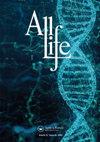Sleep as a likely immunomodulation agent: novel approach in the treatment of COVID-19
IF 1
4区 综合性期刊
Q3 MULTIDISCIPLINARY SCIENCES
K. Hassanpour, H. Esmaeili Gouvarchin Ghaleh, M. Khafaei, A. Hosseini, Gholamreaza Farnoosh, T. Badri, Mostafa Akbariqomi
{"title":"Sleep as a likely immunomodulation agent: novel approach in the treatment of COVID-19","authors":"K. Hassanpour, H. Esmaeili Gouvarchin Ghaleh, M. Khafaei, A. Hosseini, Gholamreaza Farnoosh, T. Badri, Mostafa Akbariqomi","doi":"10.1080/26895293.2023.2166131","DOIUrl":null,"url":null,"abstract":"The potential advantages of sleep concerning suppressing cytokine storms and inflammation in coronavirus disease 2019 (COVID-19) based on its immunopathogenesis are summarized in the current study. COVID-19 as a global pandemic in the past months has afflicted many people. Clinical properties, pathology, and the pathogenesis of acute respiratory disorder caused by coronaviruses or other pathogens are evidence implying the probable contribution of oxidation, excessive inflammation, and excessive immune response, particularly cytokine storm, to the pathology of COVID-19. According to findings by experimental and clinical research on animals and in humans, sleep loss impairs immune function. Sleep loss strongly influences peripheral levels of the immune response's inflammatory mediators, which is accomplished by the generation of various hormones and mediators during sleep. There are a large number of studies supporting the presence of reciprocal regulation between low-intensity inflammatory response and sleep. By improving sleep quality and at the same time adjusting the circadian rhythm, it may be possible to prevent infections and boost immunity. As a result, sufficient (or even more) sleep duration may lower susceptibility to COVID-19 infection as well as increase antibody levels. © 2023 The Author(s). Published by Informa UK Limited, trading as Taylor & Francis Group.","PeriodicalId":48478,"journal":{"name":"All Life","volume":"21 1","pages":""},"PeriodicalIF":1.0000,"publicationDate":"2023-01-19","publicationTypes":"Journal Article","fieldsOfStudy":null,"isOpenAccess":false,"openAccessPdf":"","citationCount":"0","resultStr":null,"platform":"Semanticscholar","paperid":null,"PeriodicalName":"All Life","FirstCategoryId":"103","ListUrlMain":"https://doi.org/10.1080/26895293.2023.2166131","RegionNum":4,"RegionCategory":"综合性期刊","ArticlePicture":[],"TitleCN":null,"AbstractTextCN":null,"PMCID":null,"EPubDate":"","PubModel":"","JCR":"Q3","JCRName":"MULTIDISCIPLINARY SCIENCES","Score":null,"Total":0}
引用次数: 0
Abstract
The potential advantages of sleep concerning suppressing cytokine storms and inflammation in coronavirus disease 2019 (COVID-19) based on its immunopathogenesis are summarized in the current study. COVID-19 as a global pandemic in the past months has afflicted many people. Clinical properties, pathology, and the pathogenesis of acute respiratory disorder caused by coronaviruses or other pathogens are evidence implying the probable contribution of oxidation, excessive inflammation, and excessive immune response, particularly cytokine storm, to the pathology of COVID-19. According to findings by experimental and clinical research on animals and in humans, sleep loss impairs immune function. Sleep loss strongly influences peripheral levels of the immune response's inflammatory mediators, which is accomplished by the generation of various hormones and mediators during sleep. There are a large number of studies supporting the presence of reciprocal regulation between low-intensity inflammatory response and sleep. By improving sleep quality and at the same time adjusting the circadian rhythm, it may be possible to prevent infections and boost immunity. As a result, sufficient (or even more) sleep duration may lower susceptibility to COVID-19 infection as well as increase antibody levels. © 2023 The Author(s). Published by Informa UK Limited, trading as Taylor & Francis Group.
睡眠作为一种可能的免疫调节剂:治疗COVID-19的新方法
本研究基于2019冠状病毒病(COVID-19)的免疫发病机制,总结了睡眠在抑制细胞因子风暴和炎症方面的潜在优势。在过去的几个月里,COVID-19作为一场全球大流行已经折磨了许多人。由冠状病毒或其他病原体引起的急性呼吸系统疾病的临床特征、病理和发病机制表明,氧化、过度炎症和过度免疫反应,特别是细胞因子风暴,可能是COVID-19病理的原因。根据动物和人类的实验和临床研究发现,睡眠不足会损害免疫功能。睡眠不足强烈影响免疫反应炎症介质的外周水平,这是通过在睡眠中产生各种激素和介质来完成的。有大量的研究支持低强度炎症反应和睡眠之间存在相互调节。通过改善睡眠质量,同时调节昼夜节律,有可能预防感染,增强免疫力。因此,充足(甚至更长)的睡眠时间可能会降低对COVID-19感染的易感性,并增加抗体水平。©2023作者。由Informa UK Limited出版,以Taylor & Francis Group的名义进行交易。
本文章由计算机程序翻译,如有差异,请以英文原文为准。

 求助内容:
求助内容: 应助结果提醒方式:
应助结果提醒方式:


